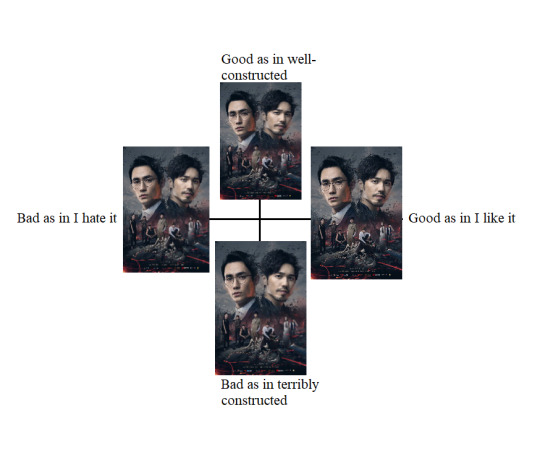Text
Baldur's Gate 3
Well hello, strangers on the internet, I am here with another wall of text that has nothing to do with the actual topic of this blog. And before you ask why on Earth do I not make a free-for-all blog: last thing I need is encouragement to write more walls of texts.
The topic of today’s Wall of Text is - shock, surprise - Baldur’s Gate 3, because it came out, and half of the internet and I have lost our collective goddamn minds.
So, today I’ll talk about why for me, as something who thinks she is a non-gamer, but who is also an aficionado of interactive storytelling - both collaborative and not - this game is a kind of a marvel that I have not seen since I was a child.
I’m doing so in three parts. The player introduces my personal perspective and relationship with video games. The interlude talks about what on earth is interactive storytelling exactly, and where RPGs fit into that term. The game mostly sings praises to Larian’s masterpiece.
As ever, this is a think piece with the main source being “my brain.”
The player.
The thing is, I’m not a gamer.
I do love video games. I play plenty of video games. It’s one of my favourite pastimes, and one of my favourite types of media. That said, I don’t believe myself to be a gamer for two reasons:
One, there is a subculture around it, and I have never been part of it, nor have I ever strived to be. It’s not that I don’t like it - it’s more that I don’t think we have the same, or even similar, values when it comes to what we seek in our gaming experience. For one, I play solo. Even in server games, I play blissfully alone, always. More importantly, I don’t pride myself on my gaming skills, because I effectively have none of those, and I’m not overly interested in developing them. When I play anything, I seek something else entirely; we’ll talk about that momentarily. For now, suffice it to say, I’m not a gamer because I say I’m not.
Two, I didn’t grow up as one. I have played a lot of old nineties/early naughties games - RPGs predominantly, but also point and clicks, and dungeon crawlers — a kind of stuff that honestly, looking in hindsight, formed a core of my interests. By the time mid-two-thousands rolled around I stopped. There are several reasons for that, but the biggest one is simply that the games outgrew the hardware I had access to. Growing up, I have never had - was never allowed to have - a console; and I have not actually had one until only five or six years ago when I was ageing out of my twenties. This massive break between gaming will be relevant later.
And, because I’m merely a person who likes video games, I have two functions for them.
Function one: a digital fidget toy. My brain frequently refuses to shush, and my hands need to do something for it to do so. This is where my deck builders are handy (Slay the Spire is my time sink of choice, but Monster Train does just as well); as are my Diablos and all their infinite clones. Those are my “in the zone” games. I am pretty okay at those through exposure by now, but being good at them is not part of the appeal because the less they need my actual mental engagement, the better. Being challenging - or me perceiving them as challenging - goes directly against what they are for me.
Function two: a vehicle for a story. The genre is immaterial. Do I like RPGs still? Doubtlessly, provided those are narrative-focused (which not all of them are). But well-written adventure games do just as well, as do indie dialogue-tree ones. And, well, this year, was absolutely wild for those, across the board.
Star Wars Jedi Survivor learnt every mistake from its predecessor and made me excited about Star Wars for the first time in literal years with the way it put you into that world and the story it’s telling. The world-building there is fantastic, and it made me want to slow down my race for the endgame payoff and savour the atmosphere much more than the first title did. I also really appreciate a game which is effectively a Dark Souls-alike allowing you to nope out of that particular style of play from the get-go.
Failbetter Games' Mask of the Rose is an absolutely sublime dialogue-tree game, incredibly well-written, intuitive, and so narratively rich that it warranted no less than a dozen play-throughs. It has its limitations - mostly through the sin/virtue of being very indie - but the core of it is absolutely breathtaking. If you like macabre horror-comedic Eldritch Victoriana, mystery solving and date-simming, I’d recommend giving this one a go.
And then Baldur’s Gate 3 had its console release - finally - and the world tilted on its axis.
The Interlude: three steps to interactivity (and then one step further than that)
Let’s envision a path to interactivity in games as a ladder.
Ground zero, absence of narrative focus.
I think it is useful to distinguish between narratives that support the act of playing and the act of playing that supports the narratives. Most games come with a story; Candy Crush Saga has a story if you squint. But, quite often, the story exists around the mechanics of playing: it’s present but not really what the title is about. Diablo games have narratives, but, let’s face it, none of us were buying Diablo IV to find out what happened in Sanctuary after the titular villain was finally properly vanquished. (If any of us are buying Diablo IV these days; although that’s a whole other can of worms.)
I see Bethesda games in this category. They have narratives, but they are not about those. They are about simulation of living in a type of reality, be it high fantasy, post-apocalypse, or space exploration.
Step one, linear narrative.
For me, a vessel for narrative is a game in which narrative is the main event, and the reason the game exists, with the engine and/or series of mechanics facilitating the consumption of said narrative. The narrative can be absolutely linear. Jedi Fallen Order and its predecessors in the platformer genre are as linear as they go: you travel from area to area, helping the story play out by engaging in predetermined events, and no one is pretending otherwise.
Step two, false-choice narrative.
Then, there are false-choice narratives: think of it as getting from one point to the next and then to the next, where the journey has some cosmetic or flavour variation. You can get from point A to point B via two or three different routes (physical, or conversational), but none of them actually change what happens at point B.
For an obvious example, some (but not all) of the TellTale Games’ titles exist within this step.
Step three, true-choice narrative.
Congratulations, we have reached interactivity! So, let’s look at that in slightly broader terms.
According to Wikipedia, interactive storytelling is “a form of digital entertainment in which the storyline is not predetermined”, which essentially means an element of choice and consumer agency.
Personally, I don’t think there is a need to limit this to digital entertainment. There is plenty of literature that I believe falls under this category, starting from Mark Z. Danielewski’s work and travelling through time and space to our friends at the indie British online magazine Voidspace.
Another obvious place for non-digital interactivity is theatre: immersive theatre specifically. If you’re not in the UK, here’s a quick run-down of things one can find under that umbrella term on our little island. Secret Cinema’s work is, strictly speaking, linear, but the variety and tangibility there can be enough to conceal that fact, and the routes you get to the outcome can be rocky enough to still have an element of choice. Punchdrunk’s promenade productions present a technically linear selection of narratives, but with a choice of which of those to follow, and so for you, the audience, the events differ from night to night. Then, there is a whole subset of game-theatre, crisis management theatre, and interactive work, which, in most general terms, gives the audience agency of playing and deciding, often with multiple possible endings at play.
If we loop back to digital media forms, however, playable films (Bandersnatch being an obvious one) exist in this realm. Quantic Dream’s interactive adventure games live here. Decent RPGs feel comfortable here too: Dragon Age series, Mass Effect, Greedfall, and Outer Worlds, just to name a few. And those are all good, don’t get me wrong.
And yet, we can still go one step further, and shoot for the sky.
Step four, collaborative (or generative) narrative
The sky, to me, is a well-run table-top RPG, which does not just engage players in a story by giving them a set of specific choices, but invites players to effectively write that story together. This process is not just interactive - it’s collaborative, with mechanics and rules existing to facilitate it. It’s not just about giving players agency in the story but taking on their active input and feeding it back to them.
What I find particularly interesting in the context of video games is that technically this was the starting point for the RPG genre: taking tabletop mechanics and digitizing them. Fallout is MSPE, but make it post-apocalyptic and computerized. Baldur’s Gate is Pathfinder - but make it computerized. Bloodlines is quite literally Vampire: the Masquerade. Computerized, of course.
For me, the epitome of RPGs up until, oh, let’s say just over a month ago, was Troika Games’ Arcanum: of Steamworks and Magic Obscura. This was a game that defined the genre for me; it’s a game that defined interactivity in general for me. It’s a game in which you could do just about anything, but more than that, the world around you was defined by your actions. Some companions would just leave - or never join you at all - if your actions and place in the world didn’t align with their values. Some decisions you made paid off dozens of hours later by, say, making entire areas hostile to you because you broke a law there in big ways early in your play-through. And yes, you did affect the fate of the world, but the paths there felt unique to you and you alone.
Naturally, whatever is programmed on a computer cannot have the limitless creativity that fleshy humans have when they (we) play games. And yet, the illusion of boundlessness was there, in those early days.
I think you see where this is heading.
The game
There are many things indeed that Baldur’s Gate 3 has going for itself. The fact that it’s been openly tested for close to three years (I was there, in the early days) meant that the final product, when it was released, was as immaculate as a game could be at this point: it is, in fact, complete. This sounds like a bare minimum requirement, but we all know this is rarely cleared. Delaying it slightly for the console was also an excellent move: I love the way it runs on PS5, and I genuinely prefer the controls here than I did on my (arguably, rickety) laptop. Again, you’d think optimising the controls for the console would be a bare minimum requirement, but I, too, played Cyberpunk upon release, so…
Larian already having a very decent top-down engine with turn-based combat also works in favour of this game. It’s certainly sleeker here, but it’s recognisable as the Divinity engine, and it’s clear to me that the resources went into fine-tuning it, which means that in the last three years, this became more and more intuitive to play. And this engine is stable, which surprised me in combat that spawned 20+ hostiles. I suppose my one qualm is that they haven’t fixed the path-making AI. While companions forgetting that they can jump is only mildly inconveniencing, NPC’s complete lack of special awareness and self-preservation can be downright infuriating. I have both re-loaded encounters because the character I tried to keep alive chose to run into an opportunity attack, and just condemned people to death deciding, at some point, that if they really truly want to Misty Step right into an explosion, so be it.
But then again, those are the only issues. In a game of this size. Upon launch.
Speaking of the engine, I found some of the encounters hard on my first play-through, even on the easiest difficulty. As I mentioned, I’m not actually good at this. That said, I loved that on none of the occasions, did my finding it difficult have anything to do with what I did and did not have: it was not about optimising, or grinding, or shopping for gear - it was about observing the failure and developing a response to the strategy the game was using against me. While you can try to select a perfect party for every situation, equally, I found that the game didn’t force you to do that, and so, as a player, I can approach party selection as an in-world process, gravitating to the companions I wanted to have around for the kind of people they were and the relationships they have with my Tavs rather than for what kind of weaponry they carry. Is the act two boss fight punishing with a mostly melee team? Definitely. But, again, once you have figured out how to get around your limitations, it is doable. To me, that’s an excellent balance. It actually makes trying to figure strategy for any given tough encounter fun; and I’m saying it as someone who rage-quit Hades because she could not stand constant failure.
The voice acting, mocap and animation are wonderful: you genuinely get full-bodied, nuanced performances, which… is just plain rare. The character writing, too, is spectacular, and the people you interact with feel real and unique, even if they only are here for a few scenes. Writing really shines when it comes to companions: they are humanly complex and multi-faceted, and all have a wonderful mix of love-able and hate-able in them. They are genuinely laugh-out-loud funny! They are also relatable, in that high fantasy way that takes commonplace anxiety and elevates it to proportions where it’s no longer real, and yet so very recognisable.
Story writing made me actually scream, the first time around. I pride myself on being someone who is quite good at reading narrative clues, and yet, there were several subplots with twists that got me reeling. This only gets better on subsequent play-throughs, when you realise just how much of the meat surrounding the main “bones” of the story depends on your character, the paths you take and the options you select. The latter is particularly astounding in acts one and two, which have so much variety in them they feel limitless.
The date-sim aspect of this game is… well, horny, in that hilarious way where every time you show a genuine interest in a character they immediately fall in love with you, provided your actions align with their worldview (which is not a given) — but role-playing always has an element of a wish-fulfilment, and I found something very joyous in thwarting (or leaning into) romantic and sexual advances of what felt like everyone in my path. Aside from that, the relationships I have seen have been well realised, each with a unique texture.
And yet, none of the above is what makes this game such a unicorn.
Choices do.
For me, true choices are defined not by the freedom to make them, but by the limitations they impose. When we open one door of possibility, other doors must close, and that is a risk we always take when we choose something. Taking an action - taking a leap of faith - should not feel safe.
In this game, opening one door can lead to another one being permanently locked somewhere down the line. Chasing what you think is right might lead to death and devastation. Trying to satisfy someone with one point of view can alienate others who disagree. Quite often, it is not a game of picking the “optimal” choice, because, as in life, optimal choices are an illusion.
This game allows you to make genuine decisions by asking yourself what difference you want to bring into the world and the lives of those fictional people you care about, and then it remembers those decisions, and pays them off. And fine, this does not happen all the time, I grant you that. I, too, feel somewhat let down by act 3 relative to early-game. The closer you get to the ending, the more you seem to be boxed into a few possible options where there would be multitude of those in act 1. But even then, the quality drop is from “so good it is actually unbelievable” to “incredibly decent”. To me, this is acceptable enough to not detract from the overall impression.
Having elements of randomness which dice-rolling introduces (and if you ask me, the very reason why dice exist in the first place in TTRPG) only enhanced this effect. Dice rolls can lock and unlock areas, they can make and unmake relationships, save and ruin scenarios. This creates a solid impression that at every step things can go awry - because they, effectively, can. Your choice here is how to approach this fate: whether to save every five minutes to try again or roll with the situation dice and your curiosity have created (pun fully intended).
Baldur’s Gate 3 is incredible because it plucks you out of your world and does not just place you in another one - it populates that world with people for you to love and admire, and hate, and feel exasperated with, gives you situations that often don’t have a straightforward moral hardline, and then asks you “how would you like to do this?”
It does what tabletop games do.
When I started DMing my first DnD campaign - which I decided, overachiever that I am, to home-brew from the ground up, - a friend of mine reminded me to fail upwards, always. In terms of storytelling, it’s a challenge. In terms of video games, it’s almost never done. You fail; or you succeed. Baldur’s Gate 3 lets you fail, and deal with the pieces you need to pick up.
And I know - of course I do - that it’s all programmed, so it cannot be truly generative, the way tabletop games can be. By virtue of having pathways, of course, a video game cannot do that. But it comes really damn close — it comes closer than anything I have seen since those early entries in the genre because those were made to directly emulate being in a campaign with live people.
For a few years now I have been lamenting that they don’t do RP video games the way they used to any more.
Well, my friends.
Turns out, Larian does.
It shoots right for the sky.
#baldur's gate 3#larian studios#baldur's gate#bg3#video games#rpg#yet another wall of text#think piece of sorts#review of sorts
5 notes
·
View notes
Text
Nice, thank you for posting this, dear.
A Short List Of On-The-Nose Queen Songs I Think The Bentley Would Play To Force Crowley To Stop Pretending Everything’s Fine (or, sad queen songs that feel like the ineffable divorce)
- Save Me
- Love Me Like There’s No Tomorrow
- Love Of My Life
- Too Much Love Will Kill You
- It’s A Hard Life
- Nevermore
7 notes
·
View notes
Text
One and Only: a review of sorts
I bet you did not expect the actual topic of this blog to resurface, and yet, here we go.
The previous time I went to a cinema to watch one of those Chinese films was actually completely by accident. I had a long break/cancellation situation at work which meant a three-hour break with a cinema around the corner. I ducked into said cinema and found out that a screening of Born to Fly has just stared, so… what’s a girl to do. I then didn’t write anything about it because I didn’t have much to say about it.
This one, however, was planned.
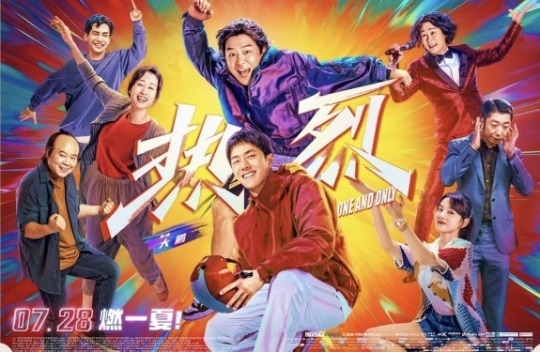
One and Only/热烈 is a story of a working class boy with a passion for dance (Wang Yibo - obviously) being roped into being an understudy for a cocky obnoxious star of a dance team by that team’s coach (Huang Bo - obviously), learning a thing or two about himself, finding friendship and hoping to one day complete in the Nationals.
As the film is in cinemas, I cannot provide visuals, so, instead, I’m gonna populate this with some of my many gifs from Street Dance of China season 3-5.
Plot-wise, it’s not really unpredictable in any way. The highs and the lows are placed roughly where you would expect them to be, all the lulls are appropriately proportioned for character development, and the final-act dance competition is as exhilarating as one might hope.
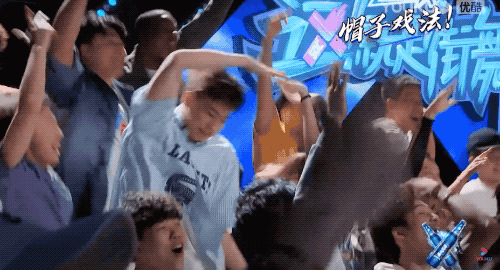
And yet… this one has a heart, it really does, and the writing really does a lot to elevate a cookie-cutter premise. The characters have a hell of a lot of inner life, including whole sets of circumstances that are merely implied - a real joy to see in any movie, I love the effect this has on the feeling of the characters’ realness. There are also fantastic decisions made pacing-wise in the final two acts, with one specific time-skip which I found very exciting indeed.
Themes of mutual respect and cooperation are not by all mean new to this kind of a movie, but I really appreciated how well developed they are, being set up in the opening scenes, and paying off in the eleventh hour; and it was lovely to see those themes explored organically. Again, writing elevates the premise here, too.
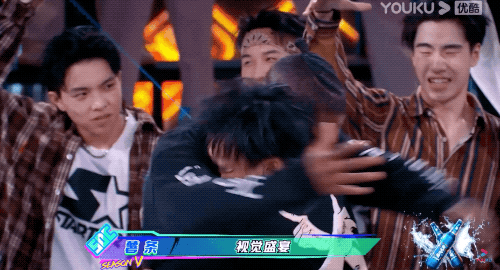
Wang Yibo’s acting keeps improving in a way which is pretty damn impressive. He seems to be a very hard-working young man, and that hard work seemingly pays off, too. Good for him. There are a few idiosyncrasies that are still very “his” (I swear I have never seen him have any screen chemistry with any woman ever), but there were also moments that read as character, and that read as truth. Honestly, he’s all grown up now, it’s very sweet to watch.
And if you are here through Street Dance of China route, whoooo boy do I have good news for you.
Ye Yin is here

Jr. Taco is here

B-Boy George is here — with plot! (Is this a spoiler? It might be. It might not be.)
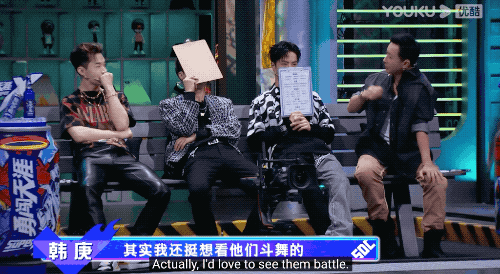
Rochka is here, with the signature ankle spin

So are Klash and MT Pop, by the way.
Liao Bo is here AND he! is! actually! dancing!

Kevin is in it, although he is not, in fact, dancing
I am certain this list is not comprehensive. Suffice it to say, there is enough on the screen to make a Street Dance of China fan very happy.

(The only real crime was that Chick was not in it. Because he absolutely should have been.)
Speaking of dance — I really want to know who choreographed this, because some of the routines were fantastic. I only wish that we could see them uncut - but of course this is a movie, and it is edited as one. Besides, you have to have cuts to be able to cut-in Wang Yibo’s dance double*, the true unsung hero of this cinematographic show.
(*last year the boy could do like, one freeze. He is a fast learner so I am ready to believe that he can be pretty good, but he is definitely not “halo five times in a row” good.)
All in all, if you are feeling sad that SDC 6 seems to be nowhere in sight at the moment, and One and Only is in cinemas near you, this comes with a cybernaght stamp of approval.
Go see your favorites doing the thing that they do - and doing it well.

You made a promise. Please hurry up. It's late August already, and you've not even announced the captains yet.
3 notes
·
View notes
Text
Alright so…
I posted my Wall of Text thinking that it will be read by possibly ten people, half of whom I know personally, because who would even want to read a Wall do Text.
Turns out… hundreds of people want to read it?
Which, for a cozy little old micro-blog, is intimidating as all hell.
And, because the format of this website is not geared to a discussion, I thought I’d make a side post, so if you wanna get comfy and have a chat, let’s do so here.
I would also like to to reply to a couple of hashtags left on the Wall of Text so far:
- this is certainly inspired by the existence of One Particular Theory, but again, I intentionally did not want to make it about just one theory, or even just one fandom, because it is not. And, judging by the amount of tags across all sorts of fandoms out here, I think I am not wrong assuming that this goes further than a couple of IPs I mentioned
- this is not some kind of a doomsday call, and I apologise if this is how it came across
- not mentioning anything about disappointment with a crafted theory being unconfirmed or not becoming canon was certainly my bad; among all other observations, that one escaped me. I wholeheartedly agree with those of you mentioning this.
- I am by no means saying that the pain you are feeling when you find yourselves let down by any product, any creator, or any “conspiracy” theory is your fault. It is not. It is very much the fault of the culture which I tried to articulate in my Wall of Text. Look after yourselves out there, and look after your hearts.
27 notes
·
View notes
Text
The fandom echo chamber: fanon, microanalysis and conspiracy brain
As someone who has been in fandom spaces, on and off, for 20 years, I find some fascinating trends popping up in the last decade that I thought to be fandom-specific but clearly aren’t. So, I would like to do a little examination of where those things come from, how they are engaged with, and what it says about the way we consume media. This is a think piece, of sorts, with my brain being the main source. As such, we will spend some time down the memory lane of a fandom-focused millennial.
This is largely brought about by Good Omens. But it’s also not really about Good Omens at all.
Part one. Fanon.
The way we see characters in any story is always skewed by our very selves. This is a neutral statement, and it does not have a value judgement. It’s simply unavoidable. We recognise aspects of them, love aspects of them, and choose aspects of them to highlight based entirely on our own vision of the universe.
Recognition comes into this. There is a reason so many protagonists of romance novels have a “blank slate” problem. Even when they do not, we love characters who are like us or versions of us that we would like to be. And when we say “we”, I also mean, “me”.
(I remember very clearly this realisation hit me after a whole season of Doctor Who with writing which I hated utterly when I questioned why I still clung so incredibly hard to Clara Oswald as my favourite companion. Then I looked at myself in the mirror. Oh. Well. That would do it, wouldn’t it?)
Then, there is projection, and, again, this is a neutral statement. Projection exists, and it is completely normal and, dare I say it, valid way of engaging with — well, anything. Is the character queer? Trans? Neurodivergent? Are they in love? Do they like chocolate? Are they a cat person? Well, yes, if this is what the text says, but if the text does not say anything… You tell me. Please, do tell me. Because, in that moment of projection, they are yours.
And then, there is fandom osmosis, and that is the most fascinating one of them all, the one that is not very easy to note while you are inside the echo chamber. It’s the way we collectively, consciously or not, make decisions on who or what the characters are, what their relationships are, and what happens to them.
(Back when I was writing egregiously long Guardian recaps on this blog I actually asked if Shen Wei’s power being learning actually was stated anywhere in the canon of the show. Because I had no idea. I have read and reread dozen of fanfics where that is the case, and at some point through enough repetition, it became reality.)
We are all kind of making our own reality here, aren’t we?
Back when things were happening in a much less centralised manner - in closed livejournal groups, and forums of all shapes and sizes - I don’t remember there being quite as much universally agreed upon fanon. Frankly, I don’t remember much of universally agreed upon anything. But now, everything is in one place: we have this, and we have AO3, and it’s wonderful, it really is so much easier to navigate, but it’s also one gigantic reality-shifting echo chamber, with blogs, reblogs, trends, and rituals.
Accessibility plays its part, too. If you were, say, in Life on Mars (UK) fandom between seasons, and you wanted to post your speculation fic, you had to have had an account, and then find and gain access to one of the bigger groups (lifein1973 was my poison, but ymmv), and then, if you feel brave you may post it, but also, you may want to do so from your alt account if you wanted to keep yours separate, and then you would have to go through the whole process again. And I’m not saying that fan creations then were somehow inherently better for it than fan creations now (although Life on Mars Hiatus Era is perhaps a bad example - because some of the Speculation Fic there was breathtaking), but there is something to say about the ease of access that made the fandoms go through a big bang of sorts.
(I mean, come on, I can just come here and post this - and I am certain people will read it, and this blog is a pandemic cope baby about Chinese television for goodness sake.)
The canon transformations that happen in the fandom echo chamber truly are fascinating to witness as someone who is more or less a fandom butterfly. I get into something, float around for a bit, then get into something else and move on. I might come back eventually when the need arises, but I don’t sustain a hiatus mind-state. This means that when I float away and return, I find some very intriguing stuff.
Let’s actually look at Good Omens here. Season two aired, and I found it spectacular in its cosy and anguished way; deliberately and intelligently fanfic-y in its plot building; simple but subversive, and so very tender. (I will have to circle back to this eventually, because, truly, I love how deliberately it takes the tropes and shatters them - it’s glorious). And, to me - a person who read the book, watched the first season, hung around AO3 for a few weeks and moved on - absolutely on-point in terms of characterisation.
So imagine my surprise when the fandom disagreed so vehemently that there are actual multi-tiered theories on how characters were not in possession of their senses. Nothing there, in my mind, ever contradicted any of the stated text, as it stood. This remained a strange little mystery until I did what I always do when I flutter close to an ongoing fandom.
I loaded AO3 and sorted the existing fic by popularity. And there it was, all there: the actual earth-shattering mutual devotion of the angel and the demon; willingness to Fall; openness and long heart-aching confession speeches. There was all of the fanon surrounding Aziraphale and Crowley, which, to me, read as out of character, and to one for whom they became the reality over the last four years, read as truth.
Again, only neutral statements here. This is not a bad thing, and neither this is a good thing, this is just something that happens, after a while, especially when there are years for the fandom-born ideas to bounce around and stew. I can’t help but think that so much of what we see as real in spaces such as this one is a chimaera of the actual source and all the collective fan additions which had time and space to grow, change, develop, and inspire, reverberating over and over again, until the echoes fill the entirety of the space.
Eventually, this chimaera becomes a reality.
Part two. Microanalysis
Here are my two suppositions on the matter:
1. Some writers really love breadcrumb storytelling.
Russel T Davies, for instance, on his run of Doctor Who (and, if you are reading it much later - I do mean the original one), loved that technique for his seasonal arcs. What is a Bad Wolf? Who is Harold Saxon? Well, you can watch very very carefully, make a theory, and see it proven right or wrong by the end of the season.
Naturally, mystery box writers are all about breadcrumb storytelling: your Losts and your Westworlds are all about giving you snippets to get your brain firing, almost challenging you to figure things out just ahead of the reveal.
2. We, as humans, love breadcrumbs.
And why wouldn’t we? Breadcrumbs are delicious. They are, however, a seasoning, or a coating. They are not the meal.
Too much metaphor?
Let’s unpack it and start from the beginning.
Pattern recognition colours every aspect of our lives, and it colours the way we view art to a great extent. I think we truly underestimate how much it’s influenced by our lived experiences.
If you are, broadly speaking, living somewhere in Western/North-Western Europe in the 14th century, and you see a painting in which there is a very very large figure surrounded by some smaller figures and holding really tiny figures, you may know absolutely nothing about who those figures are, but you know that the big figure is the Important One, and the small ones are Less Important Ones, and the tiny ones are In Their Care. You know where your reverence would lie, looking at this picture. And, I imagine, as someone living in the 14th century, you may be inspired to a sense of awe looking at this composition, because in the world you live in, this is how art works.
If you, on the other hand, watch a piece of recorded media and see the eyes of two characters meet as the violins swell, you know what you are being told at that moment. You don’t have to have a film degree to feel a sort of way when you see a green-tinged pallet used, when cross-cuts use juxtaposing images, or notice where your focus is pulled in any given shot. This stuff - this recognition of patterns - has been trained into us by the simple fact that we live in this time, on this planet, and we have been doing so long enough to have engaged recorded media for a period of time.
As humans, we notice things. Our brains flare up when they see something they recognise, and then we seek to find other similar details and form a bigger picture. This often happens unconsciously, but sometimes it does not. Sometimes we do it on purpose: finding breadcrumbs in stories is a little bit like solving a mystery. It allows us to stretch that brain muscle that puts two and two together. It makes us feel clever.
So yes, we love breadcrumbs, and, frankly, quite a lot of storytelling takes advantage of this. It’s very useful for foreshadowing, creating thematic coherence, or introducing narrative parallels and complexity. It’s useful for nudging the viewer into one or the other emotional direction, or to cue them into what will happen in the next moment, or what exactly is the one important detail they should pay attention to.
Because this is something media does intentionally, and something we pick up both consciously and not, it is very hard to know when to stop. We don't really ever know when all of the breadcrumbs have been collected. It becomes very easy to get carried away. There is a very specific kind of pleasure in digging into content frame by frame, soundbite by soundbite, chasing that pleasure of finding.
But it is almost never breadcrumbs all the way down. They are techniques to help us focus on the main event: the story. I truly believe those who make media want it to reach the widest possible audience, and that includes all of us who like to watch every single thing ever created with our Media Analysis Goggles on and those who are just here to enjoy the twists and turns of the story at the pace offered to them. And I think, sometimes in our chase to collect and understand every little clue we forget that media is not made to just cater for us.
One can call it missing a forest for the trees. But I would hate to mix my metaphors, so let’s call it missing a schnitzel for the breadcrumbs.
Part three. The Conspiracy Brain.
If you are there with me, in the midst of the excited frenzy, chasing after all those delicious breadcrumbs, then patterns can grow, merge together, and become all-encompassing theories. Let’s call them conspiracy theories, even though this is not what they truly are.
So, why do we believe in conspiracy theories?
One, Because We Have Been Lied To.
All conspiracies start with distrust.
If you are in fandom spaces - especially if you are in fandom spaces which revolve around a queer fictional couple - especially-especially if you have been in such spaces for a period of time, you have most certainly been lied to at one point or another.
We don’t even have to talk about Sherlock - and let’s not do that - but do you remember Merlin? Because I remember Merlin. Specifically, I remember the publicity surrounding the first season, with its weaponised usage of “bromance” and assertions that this whole thing is a love story of sorts, and then the daunting realisation that this was all a stunt, deliberately orchestrated to gather viewership.
And, because we were lied to in such a deliberate manner for such an extensive period of time, I genuinely believe that it forever altered our pattern recognition habits, because what was this if not encouragement to read into things? Now we are trained to read between the lines or see little cries for help where they might not be. Because we were told, over and over again, that we should.
(Yes, I think we are all existing in these spaces coloured by the trauma of queer-bating. I am, however, looking forward to a world where I can unlearn all of that.)
Two, Cognitive Dissonance.
The chain reaction works a bit like this: the world is wrong - it can’t possibly be wrong by coincidence - this must be on purpose - someone is responsible for it.
Being Lied To is a preamble, but cognitive dissonance is where it all originates. In so many cross-fandom theories I have noticed a four-step process:
A) this is not good
B) this author could not have made a mistake
C) this must be done on purpose
D) here is why
(Funny thing is, I have been on the receiving end of the small conspiracy spiral, and it is a very interesting experience. Not relevant to this conversation is the fact that a lot of my job revolves around storytelling. What is relevant is that my hobbies also revolve around storytelling. And one of them is DnD. Now, imagine my genuine shock when one of the players I am currently writing a campaign for noticed a small detail that did not make a logical sense within the complexity of the world, and latched on to it as something clearly indicating some kind of a secret subplot. Their thinking process also went a bit like this: this detail is not a good piece of writing — this DM knows how to tell stories well — this is obviously there on purpose. It was not there on purpose. I created a clumsy shorthand. I erred, in that pesky manner humans tend to. And, seeing this entire thought process recited to me directly in the moment, I felt somewhere between flattered and mortified.)
This whole line of thinking, I think, exists on a knife’s edge between veneration and brutal criticism, relentlessly dissecting everything “wrong”, with a reverent “but this is deliberate” attached to it like a vice, because it is preferable to a simple conclusion that the author let you down, in one way or another.
Three, Intentionality
I believe that there is no right or wrong way of engaging with stories, regardless of their medium, and assuming no one gets hurt in the process. While in a strictly academic way, there is a “correct” way of reading (and reading into) media, we here are largely not academics but consumers; consumption is subjective.
However, this all changes when intentionality is ascribed.
The one I find particularly fascinating is the intentionality of “making it bad on purpose” because, as open-minded as I intend to always be, this just does not happen.
It certainly does not happen in long-form media. Even in the bread-crumb mystery box-type long-form media.
When television programs underdeliver, they also underperform, and then they get cancelled.
If all the elements of Westworld Season 4 that did not sit together in a completely satisfactory way were written deliberately as some sort of deconstruction for the final season to explore, then it failed because that final season will now never come.
(There will likely never be a Secret Fourth Episode.)
And look, I am not here to refute your theories. Creativity is fun, and theorising is fantastic.
But, perhaps, when the line of thought ventures into the “bad on purpose” territory, it could be recognised for what it is: disappointment and optimism, attempting to coexist in a single space. And I relate to that, I do, and I am sorry that there is even a need for this line of thinking. It’s always so incredibly disappointing that a creator you believed to be devoid of flaws makes something that does not hit in the way you hoped it would. It’s pretty heartbreaking.
Unfortunately, people make mistakes. We are all fallible that way.
Four, Wildfire.
Then, when the crumbs are found, a theory is crafted, and intentionality is ascribed, all that needs to happen is for it to catch on. And hey, what better place for it than this massive hollow funnel that we exist in, where thoughts, ideas and interpretations reverberate so much they become inextricable from the source material in collective consciousness.
Conspiracy theories create alternate realities, very much like we all do here.
So where are we now?
I am not here to tell you what is right and what is wrong; what is true, and what is not. We are all entitled to engage with anything we wish, in whichever way we wish to do it. This is not it, at all.
All I am saying is… listen.
Do you hear that echo?
I do.
#fandom thoughts#fanon#good omens#good omens 2#bbc sherlock#merlin bbc#think piece#it's been years and I still have no idea how to tag#conspiracy theories#fandom content#all fandoms
2K notes
·
View notes
Text
This is not at all the topic of this blog, but I want to add to the Good Omens Meta Madness because I have thoughts. Spoilers. Obviously.
I don’t believe in the coffee theory, not in the strictest something-is-wrong-with-the-coffee sense.
But I do believe that that coffee shop scene is significant, and here is why.
Give me coffee, or give me death is not really a choice. No one is going to rock up and order death, that’s the point. It may present itself as a choice, but the answer will always be the same.
“So predictable”, Metatron says.
Metatron is the master manipulator here. Think about it: he enters the moment Crowley storms out, having already instructed Muriel to look after the bookshop.
He knows perfectly well that, for Aziraphale, there is no choice between embracing Heaven’s Goodness and staying on Earth.
He knows perfectly well that, for Crowley, embracing Heaven is never going to be the choice, regardless of the circumstances.
Most importantly, he knows that the very thing that stopped the Apocalypse last time was the two of them. The two of them, working together, could be the only ones to truly threaten Apocalypse: the Sequel. And hey, the last postponement of that very sequel occurred because… an angel chose a demon. This is not allowed to happen again.
“You are just the angel for the job”, Metatron says.
Metatron needs not only to offer Aziraphale the job to keep him close and secure for what’s coming next, but he also needs Crowley out of the picture. For good, preferably. And so, Metatron acts with precision, perfectly exploiting the biggest ideological difference between Aziraphale and Crowley, and makes it impossible for them to ignore it. What better way to make sure that the two people don’t cooperate than by gently guiding them into breaking each other’s hearts?
That little scene in the coffee shop is about making obvious choices: and the fact that for Crowley and Aziraphale that obvious choice is not the same.
A lot of this season was about meddling. Metatron’s is the ultimate meddling.
There is nothing wrong with the coffee.
Aside from it being presented as a logical alternative to death.
#good omens#good omens 2#good omens 2 spoilers#good omens meta#ineffable divorce#coffee theory#incredibly off-topic for this blog#sorry I just had a Eureka moment and the internet needs to know
148 notes
·
View notes
Text
The Oath of Love, known in my house as the Oafs of Love: a half-way review of sorts.
余生,请多指教 s is a long-awaited adaptation of the novel of the same title which details common-or-garden “boy meets girl” romance, in all its silliness and glory.
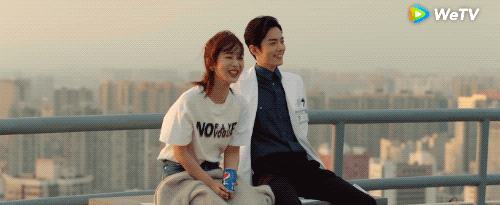
The trailer for it was shown as early as spring last year, when the leads won the King and Queen of Weibo night. A year later, the drama itself dropped without any fanfare on not one but two streaming services. Rakuten Viki shows original cut of forty-five to fifty minute episodes, and WeTV streams TV edition episodes about seven minutes shorter than that. While the content is largely the same (there might be micro differences in editing, but this is not the Untamed Special Edition situation), the cuts between episodes themselves differ. As usual, the VIP streaming is a few episodes ahead of the free release. If you want to shill out for just one of the platforms, WeTV, while being an inferior cut with no theme song, is slightly ahead of Viki; and also has an advantage of having insta-subs, while Viki takes a while with their community-sourced subtitles.
As an adaptation, it’s an interesting one, at least judging by what had been translated of the source material, which is the first 54 chapters of the novel. Seemingly, the producers decided to licence the book and then change everything about it. The novel is this sedate, glacial, cozy and almost cryptic in its narrative tale of fated love, written as a diary. The main characters meet, they like each other, the get together, the stay together. That's more or less it.
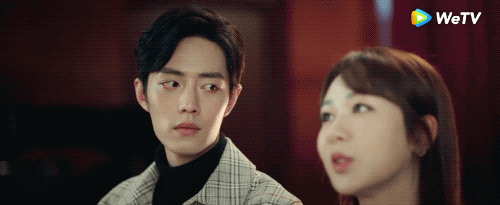
The drama, while keeping some dialogue from the novel (as in the gif above) is more of a Regency romance story wrapped in layers of contemporary rom-com tropes. There are a hundred misunderstandings per minute. There is an enemies to lovers relationship. There is a conniving romantic rival. There is a scheming BFF. There are no less than three sets of overbearing parents.
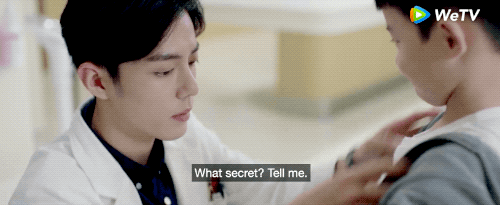
There is a child who ships the main couple. There is inherent romance of bandaging a head wound, followed by, in no particular order, by inherent romance of sharing a jacket, headphones and an umbrella. Basically, think of a single trope of the genre and I guarantee that it will be here.

Our heroes are Lin Zhixiao (Yang Zi), a music student who seems to do no course work but is hell bent on being the world’s greatest cellist. One day she bumps into Doctor Gu (Xiao Zhan), and then, due to her father’s illness, she keeps bumping into him again and again. The way he is introduced was best described by @supernovasimplicity as “Mr Darcy vibes”, which was right on the money.
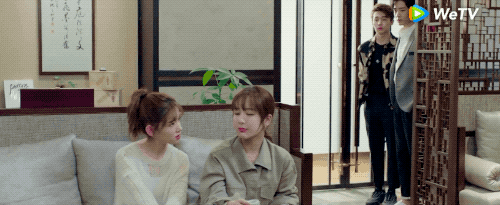
In the B-plot we have Zhixiao’s best friend Sansan (Li Muchen): a foxy, fierce kind of a sidekick; and Gu Wei’s cousin Gu Xiao (Zhao Zilu), who is your typical rich oafish playboy with a heart of gold. The later have a very Stalking For Love kind of courtship, which would have been very yikes, if not for a sparkling chemistry between the actors and Zhao Zilu’s bountiful charisma.

The weirdest thing about this whole show is that, if you look at it on paper, it sounds kind of trashy. The main relationship is built entirely out of misunderstandings, and the secondary one entirely out of red flags. The world of the show, so to speak, has nothing to do with reality. This includes, but not limited to: really weird scheduling and lifestyle of the leads; all but cackling maniacally antagonist; hospital setting which has so little in common with the way hospitals actually operate that counting all the laws it breaks per episode makes a special kind of entertainment.
And yet, for all of that… this show is incredibly charming.

The characters are not always consistently written (love how out girl Zhixiao fluctuates between being a filial child that is a mistress of all housework to not knowing the first thing about basic chores), but they are a joy to watch. You end up rooting for all of those silly humans because they are just so gosh darn adorkable. All the cast members seem to have a lot of fun with the material and bounce off of each other beautifully. For all the overbearing parents tropes, the familial relationships are very well developed. A lot of the scenes have a wonderful detail in writing and directing that makes them feel real, operating largely on subtext. The show is decently shot and snappily paced. it’s saccharine, but not at all indulgent, and not afraid to poke fun at its own romantic notions. The comedic elements of the show are genuinely laugh-out-loud funny. It’s just plain fun to watch.
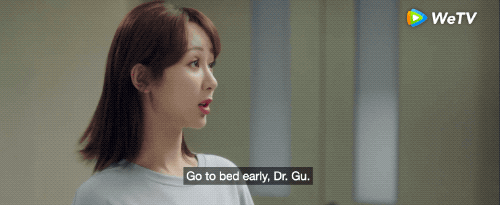
Is the Oath of Love the best drama known to mankind? Hell no. But it is, ultimately, a moreish, enjoyable, giggle-worthy romp. Sometimes, that’s more than enough.
27 notes
·
View notes
Text
Two things
First of all, happy to report that I am thoroughly addicted to the Oath of Love. I know it’s only been a few days, but I am certain I can classify this drama as “my trash” at this stage. It’s complete nonsense. I love it so much. It also coincides with a lull in my schedule, so expect both mid-season and post-season post about it.
Secondly, while I’ve not been posting about the things I’ve been watching lately, I have bumped into assorted thoughts on Luoyang in my notes app which I must’ve written a while ago. Anyone want to read those? If so, I shall post a write-up based on those.
7 notes
·
View notes
Text
Embrace Again: a review of sorts
Hello friends, I am back here after a long hiatus to share my thoughts on Embrace Again/穿过寒冬拥抱你, which has gotten a very limited release here in UK.
If you follow Zhu Yilong’s career, you’d know about this one from trailers and a ton of cute little BTS footage depicting him as a scruffy looking piano teacher. If you don’t follow Zhu Yilong’s career…
Embrace Again is a semi-anthology movie set during the Covid-19 lockdown in Wuhan, or, in other words, the very definition of “too soon”.

The story, such as it is, follows the lives of city dwellers as the pandemic progresses. A-Yung (Huang Bo) is an idealistic Kungfu-loving delivery driver who becomes an official volunteer very early in lockdown, choosing to stay away from his family in favour of offering the city his support. As way of contrast, his colleague Wu Ge (stunning Jia Ling) just wants to earn some money, but along the way she accidentally meets piano teacher Ye (Zhu Yilong), and starts gradually opening up to new people and experiences under his subtle influence. While most of the movie centers around those people, we also get to know a married business couple Li Hongyu (Gao Yalin) and Liu Yalan (Xu Fan) who are struggling to find purpose outside of their work; as well as an elderly maternity ward doctor Xie Yongqin (Wu Yanshu) who is determined to join the front line despite blooming romance in her life.
While the film is officially classed as a romantic comedy here, likely to appear to be somewhere in the same vein as Love Actually, it’s not that. The topic of love and romance is certainly present in the storylines, but they are not in focus as much as community is. As for how much of it is a comedy, while there are certainly chuckle-worthy moments, this is more or less a film that requires waterproof eye makeup. And tissues. Many many tissues. I don’t want to dive deep into the plot, as spoilers would definitely detract from the experience of watching this film, but suffice it to say that while the general feeling of it is one of heart-warming tenderness, it also dishes out micro and macro tragedies.
If you ask me what I thought the strength of the film was, I would point out how beautifully detailed all the characterisations are. The script delivers strong dialogue, pacing character development in the most effective way for every single main player; there is wonderful attention to detail when it comes to creating those people, from styling, to sets, to direction for individual scenes. As you watch the film you genuinely feel like you get to know those people: their strengths, weaknesses, values, all the little things that make them real and flawed. It was so lovely and refreshing to see a film where people just… look like people. Performances are very strong across the board, too, so much so that I would struggle to single out any particular cast member in order to praise them.
There are however aspects to the visual storytelling of the movie which did not always work for me. I can understand a certain level of pathos that would accompany a film such as this, but there were a few individual scenes at the later part of it which felt incredibly ungraceful compared to the quiet low-key nuance most of the film shows.
That said, my main complaint, once again, has to do with the way the story is structured. I really do wish that the tapestry of all of those individual narratives was woven a little tighter, and more evenly paced between the storylines. As it happens, the focus remains squarely on the two delivery drivers, leaving narratives with the least connection to them, beautiful thought they were, feeling somewhat tagged-on. I liked that they were all introduced on the same day, that being first day of lockdown (coinciding with the New Year) for them all, having a clear point where they unwittingly cross paths, but even that lacked certain consistency. Considering how much elegance the character narratives were handled individually, I really wish they the film was more tightly structured as a whole.
All in all, and despite my criticism, I did enjoy this film a great deal. It made me very pensive, and I keep returning mentally to this or that scene that touched me. This film really is a kaleidoscope of deeply moving moments.
I don’t think there is anyone out there whose life was not affected by the pandemic; we are probably going to live with this collective trauma for a very long time, and Embrace Again offers a wonderfully cathartic way of processing some of that.
P.S.
Because I know you are probably wondering, Zhu Yilong’s part in the film is a relatively small one, but it did offer a few places for him to showcase his acting. His Teacher Ye is a very warm but somewhat recluse intellectual; and his presence on screen is as wonderful as it ever is. There is a tenderness to him here that is very precious to see. I still find it deeply amusing that this man in his early thirties keeps playing people in their forties, but at least here he is styled well to suit the part.
12 notes
·
View notes
Note
Hi I would just like to say I have spent my afternoon reading your guardian recaps and I have been extremely delighted by them
Thank you for the lovely message! I’m sorry I put them on ice, focusing on watching and writing about new stuff. But I might revive them in the future! Will drop you a note if that happens :)
9 notes
·
View notes
Text
Cloudy Mountain: a review of sorts
I have sort of come to terms with the fact that any new films coming out of China I will be seeing months later, maybe, if I’m lucky. Imagine my absolute delight when a fandom friend sent me a link to a bunch of multiplexes showing this one for a couple of weeks in UK. So, below are my relatively brief thoughts devoid of any spoilers.
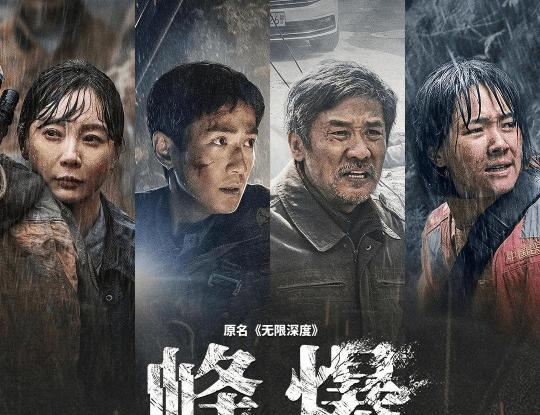
Cloudy Mountain/峰爆 is a disaster movie which is also an ode to railroad builders. Or possibly railway tunnel engineers. Or maybe both. My mandarin is not nearly strong enough to completely understand screen text, and the subs only covered spoken lines. It stars Zhu Yilong in the lead role, with Huang Zhizhong as his father and Jiao Junyan as his girlfriend, as well as Chen Shu as the director of the railroad tunnel which features prominently here.
In terms of the actual story, the film is about what you would expect: a geological disaster is about to strike, and it is up to unlikely heroes to save the day. It does not venture far from the confines of the genre. This is not where my problems with it lie.
The film’s structure really brings it down. It almost feels like it should have been an anthology, but instead the events happen to its four leads, who go through mini-conflicts that are stacked without any escalation: a series of set-pieces, strung together in chronological order but without internal logic. In effect, instead of a coherent five-act structure the story ends up being a patchwork of mini-arcs, some of which start and finish within the same scene. Aside from a couple of things that are actually set-up early and resolved in the climax of the film, it does feel like the events unfold moment by moment completely arbitrarily. This makes for a very inconsistent viewing experience: individual scenes are absolutely excellent and sport some wonderful character-driven writing, but they just refuse to sit together in a cohesive way.
This makes a film that actually does not have much in terms of a story extraordinarily hard to follow; although this might also be due to the fact that much of the content that has to do with stakes ends up being screen text, and, as such, completely flies over the head of the viewer who cannot read simplified Chinese. One does not have to dig deep into all the plot holes to find the plot itself unsatisfying.
Tonally, Cloudy Mountain hops between being a mindless high-action flick, and equally high melodrama. It switches between the two so much that some moments end up being unintentionally funny. Extremely jumpy camerawork does not help. Neither does a swelling violin-heavy soundtrack and dubious visual effects.
What saves this film are absolutely phenomenal performances and the script graciously giving the actors ample space to flex their dramatic muscles. The central relationship between father and son ends up being sweet and poignant, with a couple of strong, moving moments. Huang Zhizhong is fantastic as a bitter strict parent showing his softer side in crisis, and Zhu Yilong delivers a very powerful performance as Average Joe Turned Action Hero. I would go as far as to say this is his strongest work to date, with none of his usual idiosyncrasies in sight. If nothing else, this film makes me feel very excited about his career. It is clear that Zhu Yilong is working hard on demonstrating his versatility as an actor, and for him personally this film feels as a resounding success. His performance is physically strong and wonderfully textured. Even if you expect him to be good here, you might still be surprised.
All in all, I don’t regret going for the acting alone. It is a joy seeing an actor I admire on a big screen, but, honestly, you would not be missing much watching this on home video.
#Zhu Yilong#Cloudy Mountain#峰爆#review of sorts#this is officially a review blog now#this is an opinion and I would appreciate not having my head bitten off thank you
24 notes
·
View notes
Text
Possibly the most compelling piece of television I have watched this year
This one is well produced and filled to the brim with talent. It’s beautiful, exhilarating, suspenseful, and also sweet, wholesome and heart-warming. It made me laugh so much I cried, and cry so much I needed to take a breather. On top of that, it low-key defies censorship in exciting artistic ways.
I am, of course, taking about Street Dance of China. Season 3 specifically, although I will mention a few things about the currently airing season 4 as well.
Street Dance of a China (这! 就是街舞) is one of many Youku’s variety/contest/reality television shows, which has been airing weekly every summer since 2018. I personally have little interest in reality television (apart from, perhaps, GBBO -- you try living in the UK and not watching GBBO), mostly because of all the negative tropes associated with the genre: petty drama, exercises in humiliation, degrading contestants for failure, and general toxicity. Even Great British Bake-Off, which, arguably, is a wholesome entry in the genre, has its moments of “yikes”. Honestly, I would not have clicked “play” on SDC3 at all had a fandom friend of mine not mentioned it in a message a few months back.
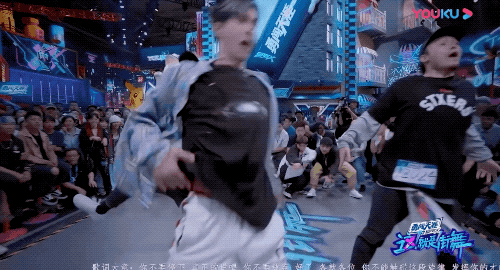
I tuned in to have something to rest my eyes on while I pottered around doing whatever it is I do on my weekdays off. An hour later I cancelled everything I had planned to get done in favour of remaining thoroughly glued to my laptop screen. The following day, my partner agreed, somewhat reluctantly, to watch an episode with me, and he found himself similarly fascinated by it. It would not be an exaggeration to say that we binged season 3 obsessively. It’s extraordinarily addictive, and infinitely watchable.
So, this is here for anyone who, like myself, has innate distrust of reality TV in all its forms, needs a nudge to give this one a go.
The format of the show is extremely comprehensible: four captains are tasked with recruiting and shaping their company of dancers, all of whom come from different backgrounds and specialise in different genres falling under the wide umbrella of “street dance”. Said dancers then compete against each other, performing choreography and/or freestyling in dance battles until, eventually, only eight of them enter the finals, and one takes the title of this program’s champion. Length of the run and individual episodes vary per season, season 3 being composed of 11 episodes ranging between two and four hours long, and a six-hour live-streamed finale. Thankfully, there are plenty of logical places in each episode where it can be put on pause, so the show can be easily watched and enjoyed in chunks. It even runs its own ad breaks, all of which are filmed in the set and feature dancers from the same program.
I would be lying if I said that I didn’t initially initially start watching SDC3 because Wang Yibo was one of the captains. I am not particularly familiar with Chinese entertainment, and I honestly did not expect to get invested in everyone appearing on this program as thoroughly, and as swiftly as I had.
SDC3 goes a very long way to establish its captains as sweet, charming, and supportive, while still having their own individual styles and strengths. Here’s the rundown of the personalities we have:
Wang Yibo is predictably competitive, serious and professional, which includes giving very specific, sometimes harsh (and yet never mean) criticism to his dancers. At the same time he is also a massive kid, and clearly comfortable enough with his fellow captains to engage in ridiculous banter.
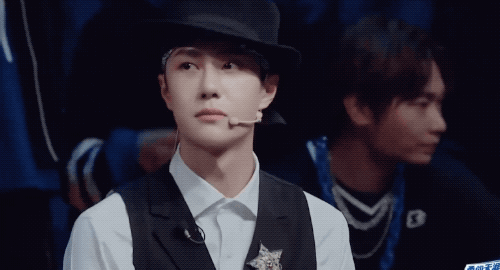
He comes to the show knowing what he likes, and yet proves himself excited for things he is less familiar with, and very eager to learn. We don’t see him buying takeaways for the members of his team, but we get from their fierce devotion to their company that he is a good leader to them.
Jackson Wang (Wang Jie’er) is pure emotionality. He is openly and unconditionally supportive of his dancers, even when they make pretty big mistakes. He clearly creates an atmosphere in which they can go wild, for better or for worse. He would be seen walking over to check in on and console contestants in pain or distress, and the impression I got was that he practically lives in the rehearsal room with his team. While being very expressive, he is not the strongest Mandarin speaker in the world, but, if anything, his awkwardness with the language actually adds to his charm.
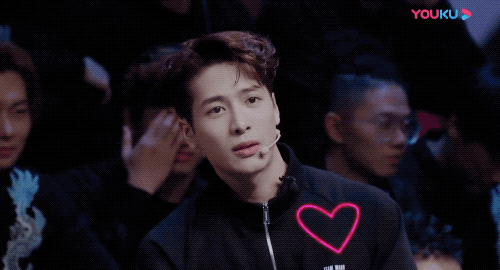
In contrast with Jackson, Zhang Lay (Zhang Yixing) is eloquent, but relatively quiet. He strategises (to varying success), and he has a very clear aesthetic, which works both with his personal brand and with the show’s ethos, integrating elements of Chinese classical style into his team’s image. His poker face is flimsy at best, and there is something incredibly moving in watching him hide in the corner or lower his cap over his eyes to try and fail to hide his hurt before retreating to sob loudly in the relative privacy of men’s bathroom. Also - and this is unrelated to the show itself - his music is *great*, and bilingual in a very fun way. I recommend checking put his most recent album, Producer. It’s pretty cool.

Wallace Chung (Who is referred to as Zhong Hanliang and nicknamed Wawa, or Wa-ge) is the most sentimental of the four. He has seemingly endless supply of little tissues he delicately dabs around his eyes. He is equally affected by losing his own performers in elimination rounds and seeing others suffer the same fate. He does not appear to have a strategy, but ends up collecting dancers he likes, and uplifting less known or younger ones. At one point he literally choses to keep all the least visible dancers on his team in order to give them a platform. Being the oldest of the group, he has what I like to call da-ge energy: he is less of a company leader, or one of the bros, but a supportive older mentor figure to his performers.
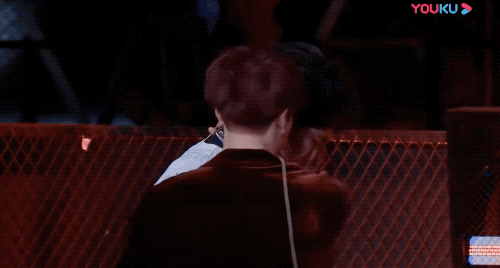
Those four are very vibrant individually, but their chemistry and dynamic is what really elevates the show. It’s a delight to see them pranking each other, and having good-natured fun, but it is equally touching and compelling to see how much support they are willing to extend to each other. For a competition, their interactions are incredibly un-competitive.
There is a whole episode of this show dedicated to captains trying to convince dancers from other teams to join them, and it is understood to not be personal: when one of the men fails repeatedly, the others cluster around for comfort, and even seemingly decide to lay off their contestants for a while.

We see Wallace cry after a big win because the losing side is devastated. We get a close-up on Lay mentioning a book of idioms he gave Jackson to brush up his vocabulary. Wallace, who is the weakest dancer of the four, is visibly uncomfortable participating in captain mock-battles, and the others rush in to dance by his side for moral support.
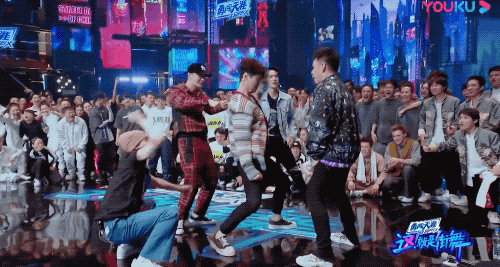
This brotherhood between the four captains, all of them different ages, all of them having very distinct and loveable personalities, is one of the most enjoyable things about this show. Their interplay is so good the program even introduces the talk-show tag-ons posted each week, although, as of me writing this, Youku has not subbed those on their channel.
I have no idea what the four captains are like in real life; I don’t know them, and it’s not beyond me to imagine that, as performers, at least some of the authenticity they portray is - well - performative, but even if that is the case, I applaud SDC3 of framing them as very down to earth.
Even when it comes to its dancers, the program specifically positions itself as a place to bring brightest in the industry and showcase their talent, rather than aggressively pit them against each other. Focus here is always firmly locked on success, on fighting against adversaries. SDC3 constantly spotlights the strengths of its contestants, and downplays their weaknesses, unless those are overcome in some way. All of this is beautiful to see.
This program shows a contemporary/jazz dancer braving his first dance battle - something he is not at all confident doing, and despite his attempt failing, it is elevated for its outrageous panache. This program shows a very cerebral, abstract piece of choreography that fails dramatically, and applauds it for trying something original and unusual. There are countless examples of performances that get downvoted and yet receive respectful feedback, with rehearsal montages focusing on the hardships those dances had gone through to put their performances together.

In the end, this does not even feel like watching a contest. I did not care who won, because I loved all of the teams for various reasons, and a dozen of dancers on all of those teams.
SDC3 puts as much attention on unique skills and personalities of their dancers - and friendships built between them - as they do of their captains. This includes interviewing the participant after filming and have them feedback on their own performances, as well as performances of their peers, but it also manifests in how much of their process dancers feel comfortable revealing in post-voting feedback sessions, in front of audience: speaking about their own insecurities, bringing up people who supported them, highlighting efforts of quieter, less eloquent performers. As a result, you, the audience, get to be as invested in the dancers as you are in their captains.
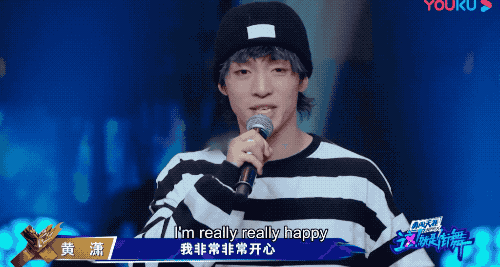
It’s hard to not grow to love the friendship of choreographer Huang Xiao and B-boy George; not to care for jazz dancer Su Lianya’s honest concern that she has a presence too dark to dance as a protagonist; not to be blown away by the mutual support of the dance couple Taotao and Cici; not to be endlessly amused by Chick’s creativity, or popper Teng Zai’s bashful energy, or locker Xiao Jie’s infectious positivity. SDC3 builds countless beautiful narratives every episode, with one purpose in mind: highlighting talent and uniqueness of all dancers on the program.

And that also includes… sort of quietly waving a tiny rainbow flag. Metaphorically speaking. I don’t want to read too much into relationships between people on this show (we know AO3 does that for us anyway), mostly because from what I have gathered cultural take on non-sexual intimacy between men is different here than what we are used to seeing in Western media, but there are parts of this show - particularly featuring a wonderful vibrant waacker Xiao Bao - that read very “middle finger to censors” to me. This includes what I perceived as Xiao Bao nearly accidentally coming out on Chinese television.
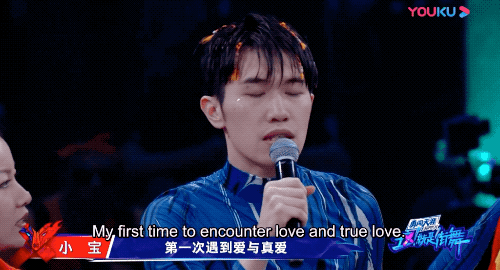
And also this moment which was repeated lots as “previously on” in which Xiao Bao picks on Yibo during battle, and the boy’s response is to grab the back of Xiao Bao’s head.
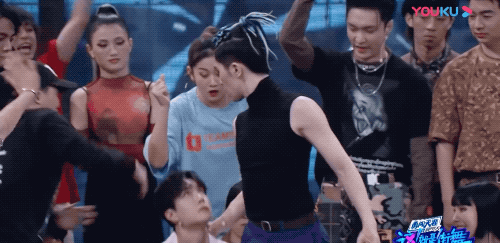
Pardon me while I leave to scream into the pillow.
I think it goes to show how watchable this program is, if I managed to write a wall of text on it before even mentioning actual dancing.
The dancing is good.
Obviously, the dancing is good.
It’s a great strength of this program that the umbrella term of “street dance” covers a whole variety of styles, from 70’s funk, to 80’s disco/clubbing scene staples, to 90’s footwork-heavy hip-hop, to trick-heavy break dancing, to styles focusing on body isolation, to downright contemporary pieces focusing on contact work, lifts, and narrative storytelling. It’s deeply satisfying to have those very different styles merge and coexist within the same program, and it also leads to some extraordinarily creative work from the choreographers present here. There are honestly a few pieces of choreography that will haunt me for a long time.

The battles, too, are wonderful, partially because you see dancers of all genres freestyle in their own unique way, showcasing great artistry and a variety of mind-blowing skills. And, partially, once again, there is wholesomeness to them. Dance battles are tense, and energetic, and sometimes cheekily provocative, but they are never actually aggressive. Opponents don’t use underhanded tactics, or mind-games. The understanding is that it’s a game, and should be approached as such.
It honestly all boils down to the idea behind the production of this show.
If you ask me why it is worth it investing 30+ hours of your life into watching Street Dance of China Season 3… the response will be the dancing itself, of course, but it’s also the sense of community and camaraderie the show instills.
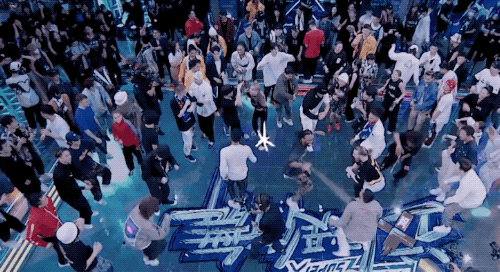
Season 4 has started streaming a couple of weeks ago on Youku’s YouTube channel - this time with subtitles for the main program as well as their hot pot eating tag-on talk show (Let’s Talk) subbed within hours of release. And I have high hopes for it. The producers seemingly understood that they have struck a goldmine with season 3, and are unlikely to top it while keeping the format, so they made a number of very clever decisions based on that.
First one was bringing back three of their pervious captains (Yibo and Lay from season 3, and Han Geng from seasons 1 and 2), adding a Canadian Kpop idol Henry Lau into the mix. I imagine it would be impossible to recreate the incredible chemistry between Season 3 captains, but what we have seen so far of the interplay between Yibo, Lay, Henry and Han Geng has been enjoyable, and it looks like all of them will be bringing their unique takes on captainship to the table.
Episodes are now even longer, but are also divided into two parts at a half-way point, which makes them easier to digest. Producers also chose to forgo the audition process altogether, instead bringing a bunch of dancers who already appeared on the program, spicing the mix with some newcomers, and inviting a large international contingent.
When season 3 had three foreign dancers (very popular French Bouboo, as well as Ukrainian Boris and Egyptian Klash), season 4 has countless performers from literally all around the globe. As it stands right now, the captains have been allocated their pre-selected teams more or less randomly, with episodes one and two dedicated to introductions and several rounds of team battles, which include both choreography and freestyle. This established that everyone in the studio deserves to be there, and does a great job at familiarising the audience with the new dancers on the show. Performances we have seen so far have been at a very high level, and there are several very bright personalities present. If anything, this makes the prospect of the upcoming qualifier round, in which half of the existing dancers will be eliminated, kind of terrifying: I am sure some of my favourites will be leaving next episode.
The ethos seems to remain the same: showcasing Chinese dance scene, but now with evident intent to make it seen internationally. I’m not at all mad at it, and I expect this season to be as thoroughly enjoyable as the one before.
As for seasons one and two… I might check them out, but I am also aware to keep expectations low, as from what I have heard they are somewhat less engaging and personable than season 3. There is a positive spin to that of course, because it must mean that the producers learn from their mistakes and choose to change and shift things season to season in order to make the best show they can.
Which, and I cannot stress this enough, their Season 3 is. It is one of the most engaging things I have seen; and I am hoping that if you have been on the fence about it this post would convince you to give it a go.
——
Personal note:
Some ten years and several dress sized ago I was in full-time dance education, a member of a small company, and considered following a career in contemporary dance. While I have only been dancing to any degree of seriousness for a few years, the pressure of having my shape constantly scrutinised, the incessant competition with other dancers (many of whom were either younger or much more experienced - or both), constantly existing on the verge of my own body’s capabilities all contributed to my mental health deteriorating so much I did not just quit, I left the country I was living it at the time. I tried to go back to dancing as a hobby at several points over the next decade, but it always spiked that burning, harrowing fear — not of failure, but of sucking. The hammer inside my skull beating out in a methodical little rhythm that I was not good enough, which always accompanied dancing. In my experience, you can never be good enough. I have neither seen nor experienced successes being celebrated ten years ago. I have seen failure being shoved into the noses of dance students: you need a better stretch, you need to lose weight, you need to grow a tougher skin, you need to push through, push against, push past, you need to push and push and push. Scrutiny over your body and focus on your shortcomings I have seen while dancing were unparalleled - even compared to drama education, theatre work or the acting world.
So, falling in love with a dance show was extraordinarily therapeutic. It’s been a very comforting experience: seeing those wonderful, beautiful dancers exist as part of the community; being supported when they express their insecurities, being comforted when they crack.
You did not need to know this. This is just me saying: I had negative experiences in the past, and SDC3 made them retroactively better. Which must count for something.
#street dance of china#这!就是街舞#street dance of china season 3#wang yibo#review of sorts#now with gifs#I come here to post a wall of text and disappear for weeks#I am doing tumblr wrong
88 notes
·
View notes
Photo
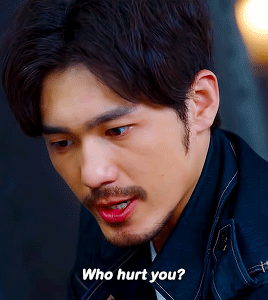
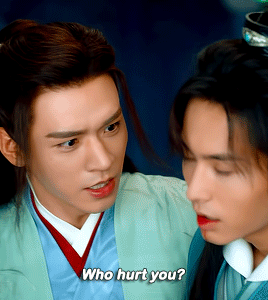
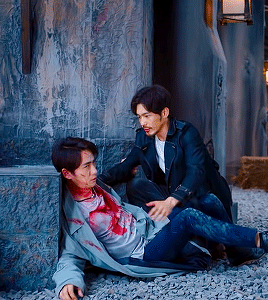
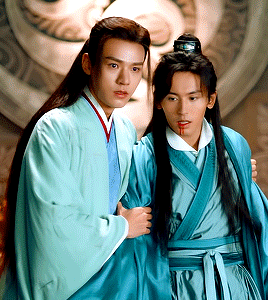
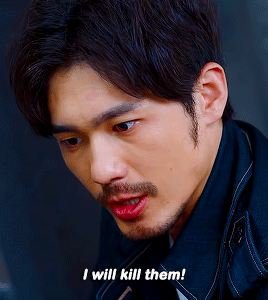
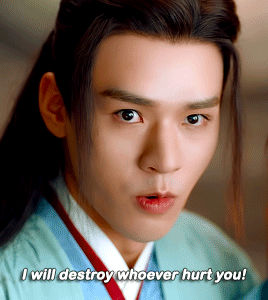
guardian 镇魂: episode 38 – word of honor 山河令: episode 11
2K notes
·
View notes
Text
The Rebel/叛逆者: A Review of Sorts
After being only semi-invested in the Rebel, I ended up getting so into it in the final weeks of its release, I’ve shelled out on IQIYI premium just to get the final couple of episodes a few days earlier.
That’s right kids, it’s a Review of Sorts. Unfortunately, I could not find a translation of the novella the drama is based on, so will be looking at it as a separate entity.
Most of this post is spoiler-free, however I have dedicated a few paragraphs at the end of it to discussing the final episode, as there are a few specific things about it I wanted to mention. There is a clear spoiler warning before that part.
If you don’t want to risk it, TL;DR version of this review goes something like this: Rebel is very decent, and positively one of the best things that I have seen to come out of China since I’ve jumped into that particular rabbit hole. It’s pretty well written, it’s very beautifully dressed and shot, and the cast is killing it. I thought it dropped the ball a little in post production, and I did not always love the pacing. Other than that, it’s incredibly decent, and well worth watching, unless communist propaganda really irks you, in which case stay very well away.
I have been having many conversations with @supernovasimplicity all the way through watching this drama, so there are likely to be some thoughts here that are influenced by those.
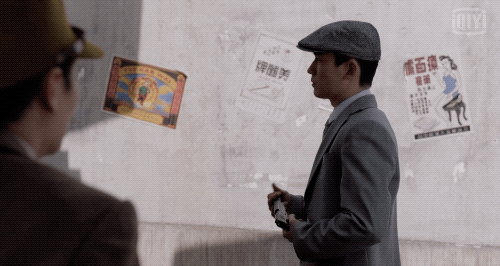
The story centers around Lin Nansheng, a struggling servicemen in the Guomingdang party. He has a great analytical mind, and absolutely no emotional capacity for his job. He has trouble handling violence, he is impulsive, he cannot speak to his superiors without bursting into tears, and has nothing even remotely resembling a poker face. And that is what makes this drama as enjoyable as it is.
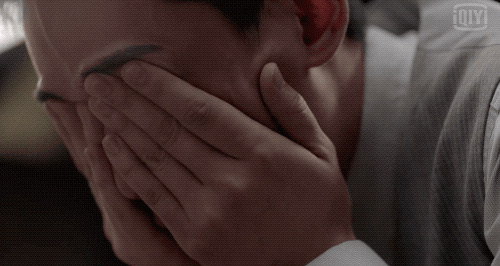
I don’t think Lin Nansheng’s journey would have been nearly as exciting had he started it from a place of competence. He botches up everything he touches because his big brain switches off the moment his emotions kick in. And so, when you see him grow in confidence, learn to control himself, learn to fake his smiles and compliments, you can’t help but feel a strange sense of pride. It also makes Lin Nansheng very likeable as a character for reasons other than Zhu Yilong’s ability to look like a bush baby.
It did take me a while to feel fully engaged with his performance - not because there is anything lacking in it, but just because it’s hard to be truly surprised by his choices after the exposure I have given myself to his work. That said, at about a half-way point I got charmed by him anyway, and there were quite a few scenes that were truly mesmerising. There were scenes where he broke out of the familiar mould of big unguarded eyes and fluttering wet eyelashes, and tried something that was not pretty: every time to a great success. I am hoping to see more of that in his future work.
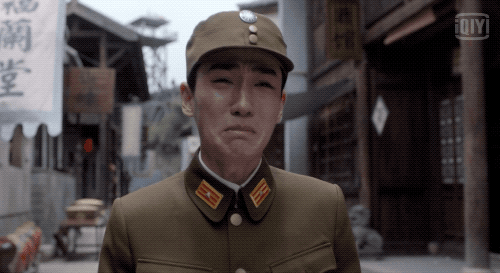
I really wanted to like the female lead, Zhu Yizhen, but unfortunately both the way she was written and the way she was performed by Tong Yao left me somewhat cold. It did not help of course that the screenplay ended up sidelining her at every turn, leaving her with very little personal agency. She was set up so interestingly, but in the end her sole purpose became being someone for Lin Nansheng to pine over. It is particularly curious from a perspective of meta storytelling: seeing how this is all centered around superiority of communism, which as a whole was, arguably, ahead of its time in the matters of binary gender equality.
The ensemble cast of the drama is stunning. Wang Yang came very close to stealing the show at several points as Chen Moqun, somehow managing to make his rather unlikeable character interesting. I can say the same thing about Zhu Zhu who absolutely shined as Lin Xinjie, showing an incredible range and imagination in her performance.
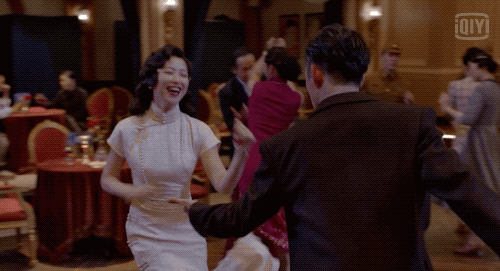
The overarching story of the show is engaging, with some incredibly suspenseful elements; every narrative arc including a nice progression through it. As spy thrillers go, it was fairly well plotted. You could if you go looking for a few things that did not pay off in a satisfying way (notably, the Chekhov’s cyanide capsule), but you overall the story really was well told for the most of it.
I did, however, feel like the pacing started to fall apart in the last quarter of the drama. Last episode in particular really did feel rushed, not just due to its pace, but also in a way it failed to pay off the final mission in any visible way. There will be more on that in the spoiler section of this post.
Important to note that The Rebel is a show made in Communist China in the year 2021. It does not ideologically side-step from the path that was laid out for it by that fact. Which is to say, it is, undeniably, filled with propaganda. Communists are the good guys, and if you think a good guy (or gal) is not a communist, they probably secretly are. With one exception of a friendly character who is not a communist, and whose fate we actually never find out. Curious, that.
The Rebel is not a kind of a show where censorship-appeasing scenes are shoehorned in. It’s a kind of a show in which the main theme is Sacrifice For the Party.
Aside from the being the moral vector of the show, Mao’s gentle teachings explicitly help get Ling Nansheng out of prolonged depression following his injury, and almost annoyingly, this sat incredibly well with the character, as he was written. Lin Nansheng is conceived as this naive idealist who wants to be on the front line, who needs validation and support of others. His - and I can’t believe I’m saying this - his being disillusioned in his beliefs and choosing to join a party which includes people whom he likes and trusts makes sense. Him finding this one thing that gives him hope and letting it propel him into gaining confidence and competence makes sense.
In many ways, the Rebel is a story of Lin Nansheng’s failure to become an antagonist within the world of the drama.
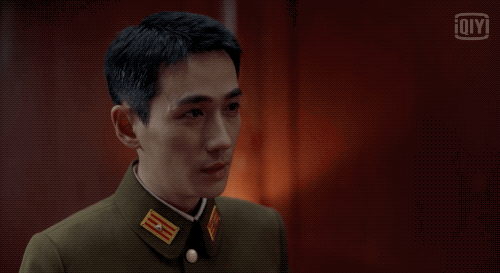
I have honestly spent this past couple of weeks pondering whether being well written makes political propaganda better or worse, whether the subtlety of it makes it more or less palatable, whether it’s enough, as a viewer, to be aware of it to shrug it off. Ultimately, this is not something I could or should make moral judgements on, but I do believe that it’s possible to acknowledge the fact that propaganda exists in the drama, and still appreciate it for a good piece of television that it is.
That said, I am very well aware that me being kind of okay with it stems entirely from my own removal from the culture this is made in, and I am, perhaps, lucky to even have a choice as to whether I want to engage with a product which is, undoubtably, here to dress political ideology in fancy clothes.
I have, on the other hand, also seen many things in Russian media of the “Annexation of Crimea is Good Actually” variety and those make me feel very unwell, so feeling somewhat at ease with blatant political propaganda in Chinese media makes me the biggest hypocrite.
But, I digress.
Before we go into some specific plot-related things, I would like to mention that the Rebel has this weird dichotomy in which the production is sublime, and the post-production… not so much. The show very well shot. Every element of it sits perfectly together, not a single prop out of place, not a single extra underdressed, not a page of script not put to good use. It’s lit to perfection. It’s scored beautifully. So much of this show is just stunning.
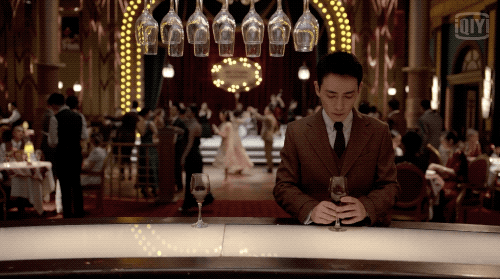
And then… there is post-production.
This is not even about bad CGI (and the CGI is, indeed, bad), it’s just that most of post-production as a whole feels rushed.
Starting with surprisingly imperfect editing, which at times just fails to make the scene flow together. The final line of dialogue would be spoken within a scene, and it would fade to black instantly without a single breath to indicate a full stop. A montage sequence would be created, but every shot within it condensed to a second, making it feel incredibly fast-paced when the effect should be the opposite. There would be a cut away from a speaking character and to the same speaking character from a slightly different angle, making it dynamic without any reason to do so. There are a couple of truly startling jump-cuts.
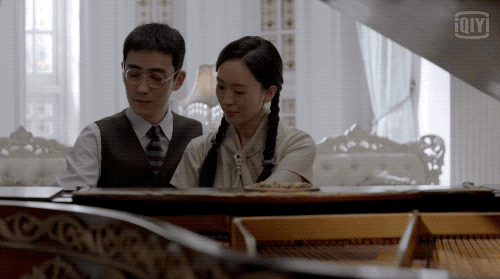
I did not speed this gif up. This is part of a romantic montage, edited like it’s a goddamn action sequence.
And of course dear old friend slowing down footage shot at 24FPS. Please don’t do this. You think no one notices - but we do.
There are other tell-tale signs of production rushing to the finish line: occasional, but very noticeable ADR glitches, very sloppy job done at sound mixing, which contribute to parts of the show feeling ever so slightly off.
It’s not unforgivable, but it does make me wish the same amount of care and efforts that went into shooting this drama would also go into it after it was all in the can.
Oh, and just because if you know me you know I have a professional fixation on fights, and I am happy to say most action scenes are toe-curlingly delightful. Hot damn those fights are good. I am absolutely in love with the shot below, for example. Placing an actor behind a piece of set so he can exchange places with the stunt double during a one shot is such an old trick, but the execution, timing and camerawork are just... flawless. This is what perfection looks like.
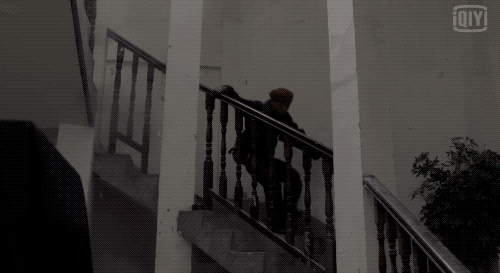
Now we got all that out of the way...
SPOILERS FOR THE SERIES FINALE BELOW
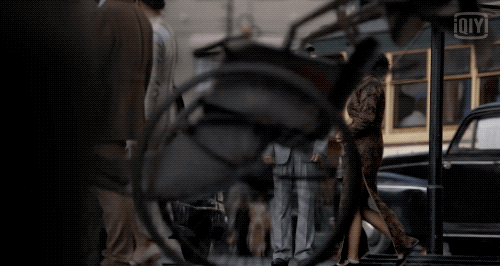
Here’s the thing. I wanted to love the ending and I found that I could not.
The final mission was presented as important, and honestly the scene in which Zhu Yizhen is sending the vital message out as Lin Nansheng holds his ground in hand to hand fight is incredibly dynamic. Party, this is due to the fight itself being incredibly well choreographed, yes, but it’s also where it sits within the narrative, how high the stakes are for everything surrounding it.
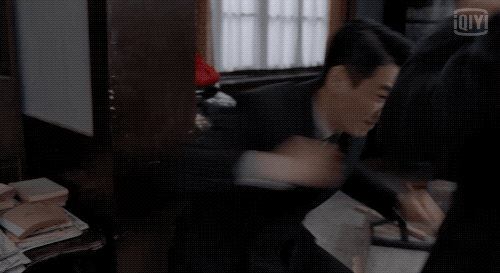
But then, the tension all but bleeds out. The Important Message is sent, the fight is won, and we are treated to ten minutes of a very slow car chase, problem of which is not even its speed as much as its placing within the story. As in, by this point both of those operatives have lost their cover, and completed their Very Important Mission. It would be very sad if they died, but their survival does not technically contribute to their cause. Moreover, Zhu Yizhen getting mortally injured in order to protect Lin Nansheng as part of her mission read a little empty when the mission is technically over.
While I personally found Lin Nansheng slow recuperation and his low key ending enjoyable, I think I would have preferred to have seen a more tangible pay-off to all the sacrifices made in the name of “bright communist future”, just a little more justification for every moment of death and despair we witnessed. I would have certainly at the very least preferred to see Wang Shi’an’s death on screen. Considering how many likeable characters martyred themselves on screen, denying us the death of the one antagonist just seemed cruel.
I really did love the ambiguity of the final few scenes however, if we consider the children choir at the end a fantasy. The idea that Lin Nansheng will live out his life in this hope that Zhu Yizhen is still alive, imagining her just outside of his field of vision, his only joy being in this fantasy of her… now, that is incredibly strong. I equally like the idea of rest being promised to him at the end of his journey, and said rest being painful, and slow and unwelcome.
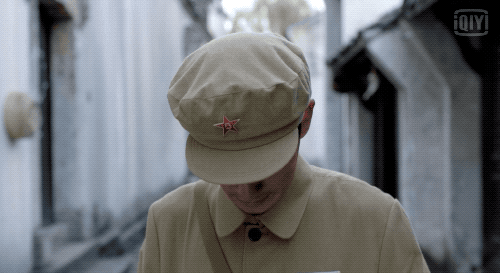
But it felt like as they chose not to to lean into the “sweet” part of the bitter-sweet tone of the ending and we’re unable not commit to the “bitter” part either, so it lands with a splat which is somewhat lacklustre.
---
This concludes my thoughts on the Rebel.
I am more or less out of Zhu Yilong’s filmography to watch, which is probably a good thing at this point. I have just emerged out of several back to back work projects - literally today - and will hopefully once more have time for things I grew to enjoy doing during the lockdown.
Those things, if you have not guessed, include watching Chinese television and writing things about Chinese television.
45 notes
·
View notes
Text
Granting You a Dreamlike Review
In my previous post on Granting You a Dreamlike Life, I went over a few early reasons on why it’s a very watchable car-crash, and I saw a few people expressing interest in what I have to say once I have finished the show. Apparently, I have to say quite a bit.
Vague spoilers for the general story with no details. I am adding gifs, but steering clear of spoilery ones.
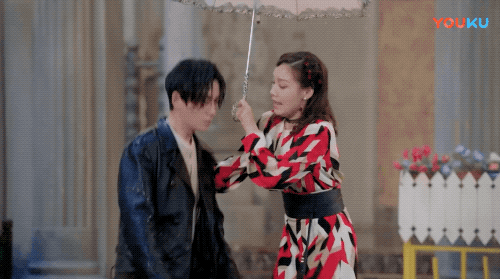
The framing device
On paper, the reincarnation framing device works. Two people meet, we discover that they experienced this epic tragedy in their past lives, then they get to know each other all over again in the twenty first century. It’s a cliche, but there is nothing inherently wrong with that. But, as is the case with most of this drama, it manages to take a sane sounding idea and make it completely incomprehensible.
As it happens, after the viewer witnesses a melodramatically tragic ending to the main story line, they abruptly move to the present time for only about twenty minutes to see reincarnated characters faff around with thematic dumpling making for what appears to be one day, then getting separated for three years, before accidentally meeting again and instantly deciding to be together forever. It’s not just rushed, it feels like a massive let-down.
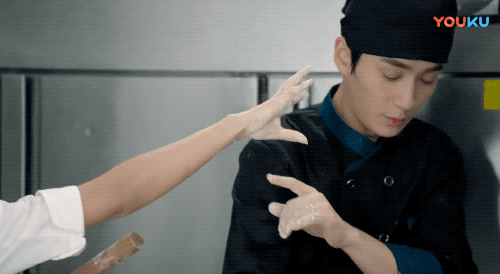
Say what you may about the writing of the main narrative (I know I will say many things about it), but it does get some things right, and the slow, gradual, logical development of the relationship between Tianying and Luo Fusheng is one of those things. It makes sense, because we see them grow into each other’s orbit, and we witness Fusheng becoming a decent human being under the influence of Tianying. Their future counterparts do absolutely nothing to justify them having this post-death happy ending. We know that they are meant to end up together because they are the protagonists of a romance drama, but there is nothing within the narrative itself that would make it so. To make matters worse, there is this really strange angle where Fusheng’s future self (called, hilariously, Musheng) explains that Tianying’s future self (Jingyun) looks and acts exactly like his dead fiancé, and there is a hint of symbolism there, echoing Lusheng/Tianying’s narrative, but it makes the framing device even more muddled.
Considering that we have spent the overwhelming majority of this show’s runtime with the 1920’s/1930′s characters, I almost wish the writers chose to forgo the framing device completely, and made the ending of the show about the aftermath of the events we saw unfolding, instead of undercutting them.

The main narrative
If I were to make an attempt at summarising most of the show’s 40 episode run, it would go something like this: Dreamlike’s story is centred around family clans still reeling from a big falling out some ten years prior to the events of the show, with the heads of all the clans driving tensions high in the city, and a newcomer mob family threatening the fragile equilibrium. It must be up to the younger generation to make sure that the war does not break out in the city of Dongjiang.
That sounds pretty decent, but, remember, if there is a sane sounding idea then Dreamlike will render it completely incomprehensible.
Setting aside the fact that said misunderstanding, which is meant to be meticulously crafted by one of the parties, completely falls apart if you give it about three seconds thought, Dreamlike’s writers make a questionable decision to clear the misunderstanding at episode 35, resolve the main conflict at episode 36, and then promptly make the story about the last-minute big bad appearing out of the blue. The big bad happens to be the Japanese, led one of the minor characters who was a villain all along. That villain is a Japanese spy, but they live in a Japanese-style house and wear Japanese costume all the time so why they were never discovered is anyone’s guess. As the Japanese were never even mentioned prior to that, a lot of retro-fitting needs to be done to shove them into the narrative, and even more hoops needs to be jumped through to make sure all the characters are involved in the final conflict. The result mostly consists of info-dumps so dense they are quite hard to follow, and narrative twists so severe they lost me completely.
If you think the love hexagon I mentioned in my first set of hot takes was convoluted, the final five episodes are that but on steroids. I spent quite a lot of said episodes pausing, rewinding, and screaming into a pillow.
Again, on paper, all the family clans coming together to unite against the common enemy, does not sound terrible, and there is nothing wrong with the pace escalating dramatically towards the climax of the show. That said, attempting to tell a very dense spy story with no set-up in the span of three episodes is... misjudged. As audience, you start on the back foot trying to catch up with the galloping narrative, and then remain on the back foot until the show runs out of characters to kill on screen.
This also means that while the final stand-down is aiming for this intensely epic tragedy with known characters dropping left and right, it ends up being mostly unintentionally funny. There is one death, notably, that made us heckle and scream-laugh because the motivation for that character checking out was utterly unclear. Unfortunately, only one character death affected me in any way whatsoever, mostly because it was underplayed: there was no slow-motion montage of their life, they did not die in the arms of their loved ones to a guitar riff-filled soundtrack (a strange musical choice for death scenes, whichever way to look at it), they did not weakly monologue about their feelings while spluttering fake blood out of their mouth. They were shot and they fell down, and for the first time in the whole show I felt an emotion that was not amusement.
Why? Because less is more.
Character development.
One thing Dreamlike does reasonably well in terms of its writing is this: it actually spends time making sure its characters develop and grow. It’s not always done well, it’s not subtle, but it’s certainly there. Most prominently, Luo Fusheng growing from this devil-may-care mercurial bad boy into a grounded, sensible head of the family works remarkably well. This is in equal parts due to a reasonable script, and Zhu Yilong’s acting, which I would maintain is not nearly as strong as in his more recent work, but is still head and shoulders above the majority of the cast.

Thankfully, Fusheng’s relationship with Tianying does not develop into a loving one before he starts respecting her wishes, learning to see her as a partner and not a object he can win, and she, in turn, calls him out on his less savoury actions without it becoming negging. They end up grounding each other very nicely, their relationship getting to the point where you, the viewer, see that they are actually good for each other, and root for them to be together, before the two even become a couple. Considering that their story started with Sexual Harassment as Courtship, I am very pleasantly surprised by it developing into something so wholesome. And I still very much like An Yuexi, she is lovely as Tianying.
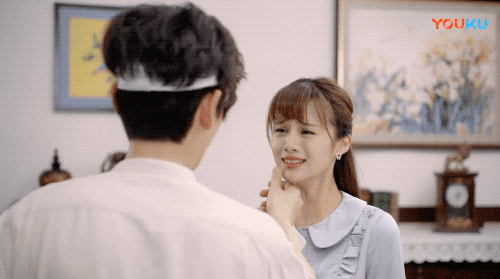
Xu Xingcheng’s character development, in stark contrast, looks so abrupt it more or less makes him into a hammy comedy villain. Apparently, losing a girl he is obsessed with is enough to make him go full Darth Vader (complete with a cape) and then stubbornly remain that way until his very brief redemption. There is also apparently an amount of scenery chewing that flips a performance from delightful to tedious.
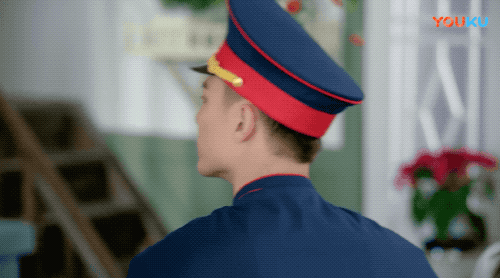
(He is in the Police of the Republic of China, which is basically a short-hand for “evil”. Also I guess we are actually in late 20’s-early 30’s.)
For a show that rushed to bring every character’s narrative to a conclusion (which included writing in a long-missing character with the only intention of killing them on screen) Dreamlike completely fails to bring the stories of its women to any sort of resolution. Tianying, who said that she wanted to be a film star, and to sing again so that she would marry opera and film, did a complete 180 late in the series and just completely abandoned her work.
Lin Xingyuan has not achieved anything whatsoever, even though she was - perhaps, not deliberately - the most reasonable character in the series.
Sidelining Hong Lan was the strangest decision. Not only did she undergo very satisfying character development of her own, growing out of being a spoiled brat and learning to take all sorts of responsibilities, and not only did her story touch heavily on domestic abuse and left that completely unresolved, but Hong Lan had every reason to be involved in the events of the final few episodes to the point where her non-involvement is actually noticeable. She is left behind the scenes with no explanation, her story left hanging in the air. Cheng Yanqiu, who portrayed Hong Lan, is honestly not half-bad, and she was done very dirty by this show.

Building a mystery
One of the biggest narrative questions of the show is Tianying’s true identity.
We get a hint that she is maybe adopted, and perhaps not just a mere orphan either, quite early in the story. Then, there is a scene in which one of family leaders reminiscences about his lost daughter, adding that she would have been twenty two were she alive still. In the very next scene Tianying mentioned that she is a full grown-up twenty two year old.
So, that’s that mystery gone in an instant. The mystery is no more before any other “hints” are dropped, before Significant Jewellery comes into play, and good twenty episode before the backstory gets revealed in full.
And, alright, you may say that maybe it’s not about the audience discovering the truth as much as it’s about the characters doing the same, but if that is the case why oh why does Dreamlike make no less than six explanations of the Significant Jewellery: the person who made it reveals its origin on screen to two different characters, and then rounds are made, explaining it all over again to other characters. In the best traditions of bad screen plays, audience is forced to see every agonising second of something they have known for a long while being explained over, and over, and over again.
Editing and quality control
If you are watching the series on Viki, there is a scene in episode 39 with shots are left unrendered and time-coded, but either this is something that was fixed later on, or this problem was created during subbing, because this issue is not present on Youtube. Which means that the editing team has, in fact, done the barest minimum of their job.
The editing overall is sloppy, and has several quirks that are very noticeable, such as the absolute majority of the scenes being several seconds longer than they need be. It’s true that there is usually a delay between the scene playing out and the director shouting “cut!”, but leaving this dead space in the final product just bogs it down.
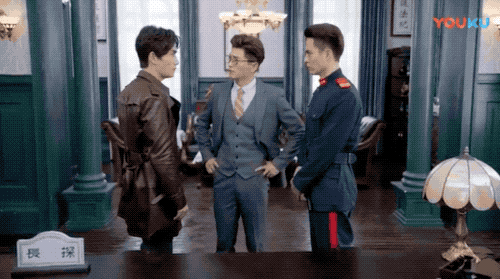
There were also, hilariously, scenes that cut to black and then are brought back to life, as in a choice was made to pad them for runtime and no one bothered to edit transitions. This creates a curious dissonance within the pacing of Dreamlike, which on a macro level is still so fast it makes the story hard to follow, and on the micro level is screechingly slow. If shows could get arythmia, this is what it would look like.
On top of that, there little continuity issues, or colour-grading glitches, or scenes shot across a period of time with no one making sure the light actually matches.
And it’s funny, but it’s also kind of sad. How can you expect me to care about this drama if the people who made it clearly did not?
Action coordination
The action sequences are, for the most part and barring the final confrontation, pretty good.
What?
I am dunking on things that warrant dunking on, and the fights certainly do not.

And yes, one can definitely nitpick them for small mistakes here and there (looking at our boy Zhu Yilong here who decided that grabbing his sword by the blade was a good idea), and the editor certainly does not help, but this show’s stunt coordinator had done a very admirable job, and his stunt team are fairly good as well.
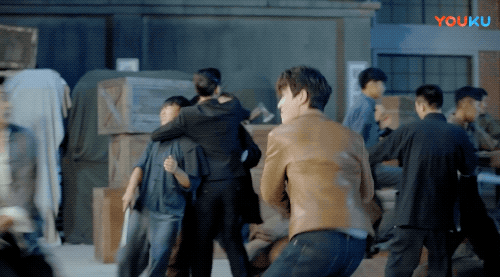
Hero fights - one lone hero against a wave of enemies, that is - are never easy, and Dreamlike manages to pull them off pretty well. More than that: action sequences have a logic to them, they effectively tell a story, they look interesting, and characters shine through the moves. Most notably, Xu Xingcheng’s brawling sequences during his police bootcamp are excellent.
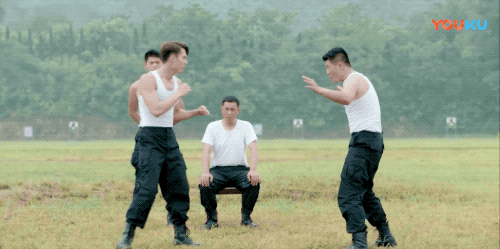
None of the above applies to the final shoot-out. I have nothing good to say about that: it’s geographically confusing, and full of physical impossibilities, which lowers the stakes at every turn, and contributes to the alleged emotional highlight of the series being unintentionally funny. But apart from that one, the fights - especially ones with cold weapons - get a thumbs up from me.
Film industry and misc. observations
Half-way through the series Tianying becomes a film actress. You’d think people working in recorded media would maybe make content that adequately represents their profession.You’d be wrong. Aside from the obvious - they are filming talkies, and there is not a single piece sound recording equipment in sight - there is just so many baffling bits happening on set. From directors throwing away the script and just letting their cast run completely unsupervised, to venting your own personal grievances through the scenes (not okay), to waking away from the set (super not okay), to spewing utter nonsense about acting as a profession. You really feel for the cast that has to deal with all this with straight faces.

It’s pretty funny how there is a scene where Tianying is bullied into performing multiple takes in which she has to drink alcohol. The narrative significance of the scene is that we see that one fellow cast member treats her poorly while another has her back, but on a meta level…
Is this not a very clear illustration why the cast should not be forced to drink alcohol on set? Especially in the scenes that feature intimacy or fight choreography? The show hits it on the nail with it being a bad idea and then proceeds to do it to itself.
I know it’s not a Dreamlike feature as much as just a Cdrama feature (and perhaps on the wider scale an East Asian television feature), but every time I really feel for the cast when they do it.

Dreamlike does quite often substitute hard liquor for either the strange yellow liquid or flat beer. Needless to say I preferred the former - not only because it’s likely to be non-alcoholic, but also because it does not foam when being thrown around.
So. This was Dreamlike.
I could say more, but I’ll stop here.
Dreamlike was pretty bad, but I enjoyed it even though it made me scream and despair. I kept coming back even after I rage-quit watching it a couple of times.
Incomprehensibly, I don’t regret spending some thirty hours of my life on it. That said, I feel a strange sense of relief knowing I am finally well and truly done with this drama.
----
Side notes.
Next up, the Rebel! I have been very busy and unable to catch up properly, but there will definitely be thoughts on that because what I have seen was stunning.
Oops this is now accidentally a review blog.
(Guardian recaps are not dead, I just had a very hectic couple of weeks with work and such so it’s a little involuntary hiatus. I am half-way through drafting Episode 14, so it will be here eventually.)
32 notes
·
View notes
Text
Granting You a Dreamlike Drinking Game
Oops I ate through another 15 episodes of this thing. There will be definitely another set of opinions on the matter because whoooo boy is this drama extra. But for now, thought I’d share a drinking game I’ve got going every episode. @supernovasimplicity, this one is for you.
It’s not very funny but it’s... uh.. effective?
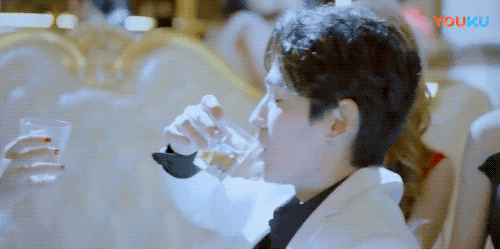
General Pool
Duan Tianying is called a naive little girl. Drink twice if she is introduced to a thing she has never seen before
Luo Fusheng goes into murderous rage
Duan Tianci has a BIG REACTION
Hong Lan is hitting things. Or people. Or the bottle.
Yuanyuan delivers an ace pick-up line (because this girl may look like an innocent flower but she is an absolute fox)
Homoerotic undertones
Stalking as an act of love
Music is performed on screen. It is definitely not the music track that is mixed into the scene.
Characters consuming mysterious bright yellow liquid that is definitely neither whiskey nor baijiu, as illustrated below
The Swarm of adoring screaming fangirls surrounding any of the boys
Exotic western things. Drink twice for exotic western people (I get that it’s a period thing, but it’s very charming)

The Pool of Anachronisms
LED lights
Nine inch stiletto heels
Double denim
That’s Not Bakelite (this includes colourful cocktail straws, disposable plastic forks and other bits of contemporary plastic paraphernalia)
Are you sure balloons is what you want in this scene?
A character says “Okay” in English
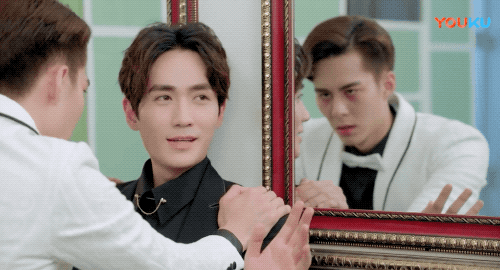
God Mode Pool
Only do this once per episode. If you are feeling brave maybe pick one or two of those to do every time. Don’t come at me when you have alcohol poisoning by drinking every time each of those things happen.
“What the hell are they wearing?”
Dramatic zoom
Slow motion. Drinks twice for slow motion in flashback montage sequences. Drink thrice if the slow motion shots are made with footage recorded at 24 FPS and then slowed down
Inner monologue spoken out loud
All the parents are terrible
A man ignores Tianying’s explicit wishes
I Have a Green Screen And I’m Not Afraid To Use It
Fried pork dumplings
#granting you a dreamlike life#drinking games#this is senseless#i'm not sorry#now with gifs#zhu yilong
40 notes
·
View notes
